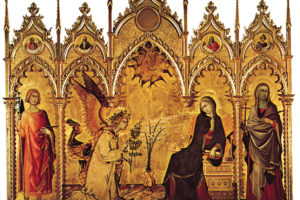This Wednesday, the cloudy puffs of the fumata bianca from the Sistine chapel told the world that, in unexpectedly quick passion, the Catholic Church would have a new world leader. At the age of 76, Cardinal Jorge Bergoglio, former leader of the Arch Diosese of Buenos Aires, will become a Pope of many firsts. Not only is he the first non-European Pontifex of Rome, but he is also the very first Jesuit[1] to bear the title as well.
Furthermore, in contrast to his predecessor, he has chosen a papal name that has never before been selected, Francis I, named after the esteemed 13th century saint famous for his vows in favor of poverty, animals, and his calling to rebuild a local church. He already bears the expectations of many that he will likewise rebuild and renew the world’s largest organization in ways that will allow it to move past the sexual and financial scandals of the last few years.
So, from the perspective of a Protestant and (in corresponding Sola Scriptura fashion) my clearest understanding of a Biblical perspective… what is the significance of the Pope, and the quality of that man in that office, today?
To summarize it in one word, I would say: MASSIVE. And let me explain why…
The Impact of the Papal Vision for Reform: Yes, the Pope’s power to speak ex cathedra can drastically change the direction of Catholic thinking and the mind. But today, I believe the Pope’s more powerful influence lies in the way his stated mission can shape the Catholic person’s heart. Over the last few decades, and last few years, the hurting and confounded eyes of 1.2 billion catholic sheep have been on the Vatican and its scandals regarding sexual and financial crimes committed by Catholic leadership. If Jesus’ words to his disciples can in fact be transferred to the body of the Catholic church today, if “where your heart is, there your treasure will be also,” then the billions of dollars in the coffers of the Vatican Bank show that many faithful tithers have entrusted their hearts to the leader of their church. If increased transparency and housecleaning of inner corruption can be achieved (or even partially realized) in Francis I’s lifetime, pastorally this may have a strong strengthening effect on the faith and the souls of many a Catholic believer. Likewise, if a Vatican reform coincides with increasing testimonies of scandal within the protestant church, an increased perception of stability might increase the number of “Christian-to-Catholic” conversions that we will see in the future.[2]
The Impact of the Pope’s Ecumenical Vision: Ecumenicalism, evangelism, and even hints of universalism from some Catholic scholars or leaders, have become the focus. After several centuries during and after the European Reformations which focused on who the Catholic Church would damnify and “keep out” of the church, the last few decades have changed to focus on re-drawing people back in. Perhaps the paramount evidence of this is the 1994 document called Evangelicals and Catholics Together, one which sought to warm the chilled tensions between the Catholic Church and protestants, and to focus on areas of agreement, verses areas of difference.
If this mission continues with Francis I, I see several cultural and theological developments. First, the distinguishing lines between Catholics and Protestants will continue to grow increasingly blurry, with the ultimate result that theology will increasingly be subordinated (if not near eliminated) by the increasing presence on ecumenical unity. While unity within the “invisible church” IS crucial, a tomorrow that exchanges a love and a value on biblical literacy and theological precision for anti-intellectualism is not the solution of the future that we want to see. Additionally, in an effort to “reform” and to rebuild the Catholic Church’s blighted reputation and to become more well-liked by the world, I could foresee the third millennium gospel message of the Vatican sounding more and more like universalism. And for the “protestant,” it will see a future that continues to dilute the gospel’s message of a single, exclusive salvation by means of faith in Jesus’ shed blood and resurrection in a world that will be either increasingly hardened or increasingly indifferent towards any response of faithful commitment that the gospel demands.
The Impact of the New Pope as Pastor: Unlike his predecessor, Francis I’s career is populated with experience as a third world pastor, rather than a Western World academic. Having lived most of his life in a humble apartment home in Buenos Aires, much of his career has been driven by a heart for justice and mercy that has sought to defend the poor and to serve the immediate needs of broken people. If Francis I learns how to continue this lowly and humble brand of ministry while in a position of such elevation and protection, I see two major ramifications for evangelicals. First, it will provide a stark challenge and model to celebrity and mega-church leaders to do likewise; Justice and Mercy ministries continue to gain attention and popularity in both church and society. A Pope engaged in such might challenge protestant leaders to imitate, so as to not lose pastoral credibility. And at this point, we will see what happens to the ministry of Gospel proclamation—will justice ministry endorse and empower it… or OVERpower it?
Ultimately, Francis I takes the leadership position over 1.2 billion people. I think only Xi Jinping can top that. To deny the leadership impact of someone with such resources to leverage is naïve. Although his inauguration seemed to set the tone that his leadership style will be mild-mannered and meek, his decisions can and will effect Catholic’s below him to some extent. Many question how much authority and influence the Pope actually has over a church that can seem so different depending on which continent you are visiting. And, I would agree with most of these observations. But still, this appointment is one that cannot be ignored. And… one for whom prayer should not be spared.
[1] An order of the Catholic church most famously known for their concentration on supporting and fostering education
[2] Both at the academic-headline level (i.e. Scott Hahn, Peter Kreft, Francis Beckwith), and the popular level





2 Comments
Leave your reply.